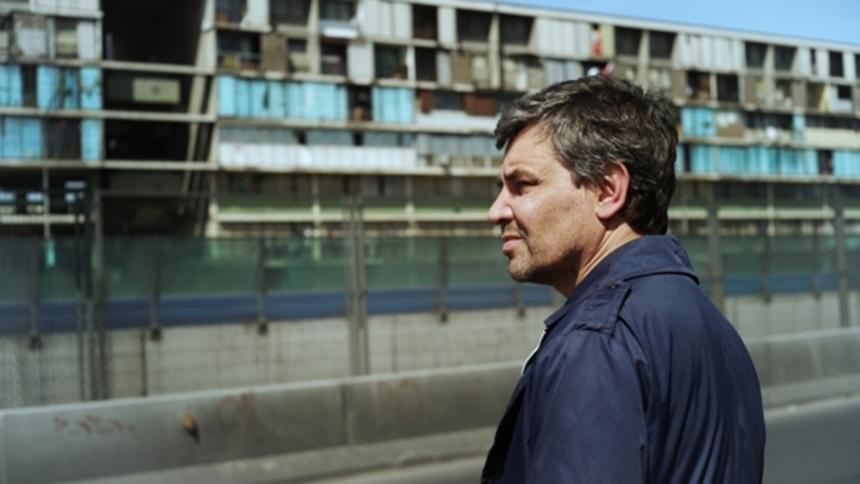Review: CARNE DE PERRO Is A Guilt Trip

Now, I'm not complaining, I'm truly happy when these movies are finally released in Chile as many seem to be on an endless loop of film festivals around the world, whetting the appetites of many but never becoming available to watch back home. With Carne de Perro (Dog Flesh) it's curious how a film as close in its aesthetic to what could be called 'arthouse sensibilities' can have such a wide release, especially with so many scenes that are really hard to watch. It could be a sign that local audiences are changing enough to take a look at different stories, especially one such as this that deals with a man who hides in the shadows of his own past trying to wrestle with decisions he's made.
This is the story of Alejandro (played perfectly by Alejandro Goic), an ex-CNI agent who worked in a similar fashion to the SS Gestapo under the government of Pinochet in Chile. He is divorced and can't work at the moment; the taxi cab that he uses to make ends meet is broken and the mechanic doesn't seem to help one bit. During all this we see how Alejandro is clearly disturbed; he has fits of rage that make him hit the walls and door of his house furiously, he has panic attacks in the middle of the night, and what may be one of the most unsettling moments of the film, he hurts his own dog.
The film tells its story through scenes of Alejandro in different landscapes of the area in which he lives, a low-middle class condition that is the complete opposite of the pride that he seems to feel towards his work during the dictatorship. This pride can be felt through his continuous maintenance of his image as a patriot and a good Chilean, such as putting up two Chilean flags on the roof of his house once he is informed of the suicide of one of his companions at the CNI. Likewise he listens to marches and military songs as he prepares boiling water, not to cook, but while fuming about his dog dragging his clothes through the garden.
Alejandro is always framed in some way so that he seems alien to the world around him. His curved back and attitude of 'I'm just passing by, don't notice me' is a psychological aspect of his performance enhanced by the visual composition, with Alejandro positioned on one side of the frame most of the time, such as when he is walking, crossing a bridge, spying on someone, or washing his hands continuously.
It is thanks to the strong performance of Alejandro Goic, that even if we never actually know what he did during those years we can still guess that he did awful things. This is especially felt when we see what he does to the only companion he had left: his dog.
Nevertheless, while the movie is based around the performance of Goic, it's lacking in other aspects, especially when it comes to surprising the viewer with visual flair. While the cinematography is serviceable (beyond the shot structure or framing) it is completely uninteresting. Likewise the plot and script, while minimalistic, still contains lines that are extremely forced and pointless characters that don't seem to bring any energy to the story.
Taking away a little from the viewing experience locally is the fact that each and every one of the supporting characters surrounding Alejandro is played by a famous Chilean actor. At the screening I attended there was plenty of actor-spotting as if the audience was playing a game. Most shocking was Catalina Saavedra, famous even outside of Chile for her role in The Maid, but who only has a non-speaking role and appears for about 30 seconds.
Alejandro Goic is also a bit overused in Chilean films, but here he manages to create a full character that generates dual feelings of compassion and disgust, and that isn't something you can say every day.
The film is certainly watchable, despite violent scenes with the dog that must be among the most disturbing in Chilean cinema in a long time. It is recommended to those who can see it in theaters in Chile. It may not be a great movie, but it does carry a great central performance.

Do you feel this content is inappropriate or infringes upon your rights? Click here to report it, or see our DMCA policy.






